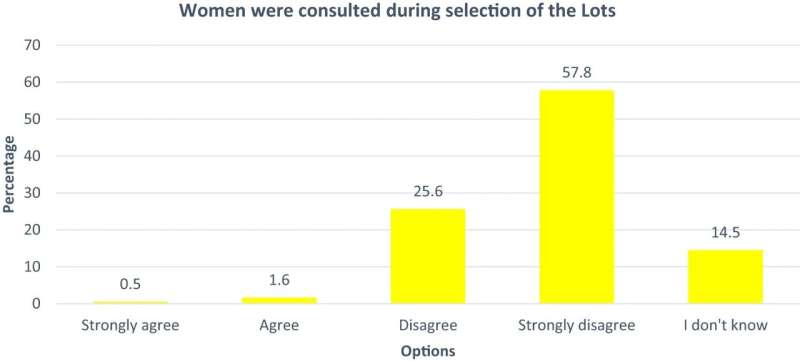This article has been reviewed according to Science X's editorial process and policies. Editors have highlighted the following attributes while ensuring the content's credibility:
fact-checked
peer-reviewed publication
trusted source
proofread
Study calls for better inclusion of women in environmental decision making in Nigeria

A study has shed light on the critical importance of women's participation in environmental decision-making processes, particularly in regions where it poses a significant threat to livelihoods and well-being.
Despite being disproportionately affected by the loss of natural resources, women in the Niger Delta region of Nigeria are often excluded from efforts to improve the landscape.
A new paper, published in Environmental Management, examines the challenges and opportunities experienced by women in the Ogoni contaminated land remediation project, one of the areas most affected by oil spills.
It found women involved in farming and fishing—vital activities in the Niger Delta—face increased vulnerability to contaminated land, food insecurity, and conflicts driven by the loss of environment. But they are not included in environmental decision-making that could ultimately improve their circumstances.
The findings suggest that a lack of trust and confidence in the drivers of these processes can significantly affect women's participation in management. Cultural beliefs and practices also affect their involvement, and even when they are included, their roles are informal or insignificant.
Lead author, Dr. Kabari Sam from the School of Environment, Geography and Geosciences at the University of Portsmouth, said, "Greater involvement of women is globally believed to enhance environmental management outcomes.
"In developing countries, they engage and interact with the environment daily because typically they're responsible for agriculture. As a result, women understand threats of a compromised soil, and the potential impacts on people's health.
"By addressing the barriers that currently impact women's participation in the Niger Delta, we can create a more sustainable and equitable future for not only those living in that area, but also regions with similar cultures."
The researchers interviewed 400 people, including women, lawmakers, policymakers, regulators, civil society organizations, environmental management practitioners, and government agents.
Almost all respondents (98%) said they were not satisfied with the current level of women participation in the clean-up process. The majority noted that women were not engaged as contractors (99%), or employed at sites being cleaned (86%).
One woman said, "Ever since this clean-up started, women have not been given any consideration. We are the ones that can no longer go and farm, we are the ones that can no longer take care of our families."
The paper suggests several strategies to enhance women's involvement, including creating platforms for capacity building, developing gender policies, adapting appropriate communication strategies, initiating women's networks, and strengthening social cohesion.
"Our findings further cement the crucial role women play in environmental management," added Dr. Sam.
"What we need to see is a shift in decision-making processes to ensure that their contributions are recognized and integrated. Women's involvement shouldn't just be participation, it needs to go a step further so that they can have a meaningful influence on environmental outcomes in their home region."
In conclusion, the paper emphasizes the need for inclusive decision-making from a multi-level policy perspective, starting with organizations like the Hydrocarbon Pollution Remediation Project (HYPREP) and extending to government bodies at all levels.
More information: Kabari Sam et al, Inclusive Environmental Decision-making in a Developing Nation: Insights from the Ogoni Remediation Project, Niger Delta, Nigeria, Environmental Management (2023). DOI: 10.1007/s00267-023-01885-y
Journal information: Environmental Management
Provided by University of Portsmouth




















